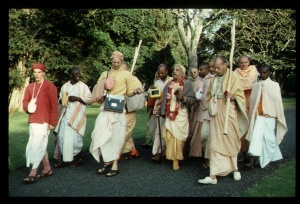CC Adi 7.13 (1975): Difference between revisions
(Vanibot #0027: CCMirror - Mirror CC's 1996 edition to form a basis for 1975) |
(Vanibot #0020: VersionCompareLinker - added a link to the Version Compare feature) |
||
| Line 2: | Line 2: | ||
<div style="float:left">'''[[Sri Caitanya-caritamrta (1975)|Śrī Caitanya-caritāmṛta (1975)]] - [[CC Adi (1975)|Ādi-līlā]] - [[CC Adi 7 (1975)|Chapter 7: Lord Caitanya in Five Features]]'''</div> | <div style="float:left">'''[[Sri Caitanya-caritamrta (1975)|Śrī Caitanya-caritāmṛta (1975)]] - [[CC Adi (1975)|Ādi-līlā]] - [[CC Adi 7 (1975)|Chapter 7: Lord Caitanya in Five Features]]'''</div> | ||
<div style="float:right">[[File:Go-previous.png|link=CC Adi 7.12 (1975)|Ādi-līlā 7.12]] '''[[CC Adi 7.12 (1975)|Ādi-līlā 7.12]] - [[CC Adi 7.14 (1975)|Ādi-līlā 7.14]]''' [[File:Go-next.png|link=CC Adi 7.14 (1975)|Ādi-līlā 7.14]]</div> | <div style="float:right">[[File:Go-previous.png|link=CC Adi 7.12 (1975)|Ādi-līlā 7.12]] '''[[CC Adi 7.12 (1975)|Ādi-līlā 7.12]] - [[CC Adi 7.14 (1975)|Ādi-līlā 7.14]]''' [[File:Go-next.png|link=CC Adi 7.14 (1975)|Ādi-līlā 7.14]]</div> | ||
{{CompareVersions|CC|Adi 7.13|CC 1975|CC 1996}} | |||
{{RandomImage}} | {{RandomImage}} | ||
==== TEXT 13 ==== | ==== TEXT 13 ==== | ||
<div class="verse"> | <div class="verse"> | ||
: | :'bhakta-avatāra' tāṅra ācārya-gosāñi | ||
:ei tina tattva sabe prabhu | :ei tina tattva sabe prabhu kari' gāi | ||
</div> | </div> | ||
| Line 18: | Line 17: | ||
<div class="synonyms"> | <div class="synonyms"> | ||
bhakta-avatāra—incarnation as a devotee; tāṅra—His; ācārya-gosāñi—the supreme teacher, Advaita Ācārya Prabhu; ei—all these; tina—three; tattva—truths; sabe—all; prabhu—the predominator; | bhakta-avatāra—incarnation as a devotee; tāṅra—His; ācārya-gosāñi—the supreme teacher, Advaita Ācārya Prabhu; ei—all these; tina—three; tattva—truths; sabe—all; prabhu—the predominator; kari'-by such understanding; gāi—we sing. | ||
</div> | </div> | ||
| Line 25: | Line 24: | ||
<div class="translation"> | <div class="translation"> | ||
Śrī Advaita Ācārya is Lord | Śrī Advaita Ācārya is Lord Caitanya's incarnation as a devotee. Therefore these three tattvas [Caitanya Mahāprabhu, Nityānanda Prabhu and Advaita Gosāñi] are the predominators, or masters. | ||
</div> | </div> | ||
| Line 32: | Line 31: | ||
<div class="purport"> | <div class="purport"> | ||
Gosāñi means gosvāmī. A person who has full control over the senses and mind is called a gosvāmī or gosāñi. One who does not have such control is called | Gosāñi means gosvāmī. A person who has full control over the senses and mind is called a gosvāmī or gosāñi. One who does not have such control is called godāsa, or a servant of the senses, and cannot become a spiritual master. A spiritual master who actually has control over the mind and senses is called gosvāmī. Although the gosvāmī title has become a hereditary designation for unscrupulous men, actually the title gosāñi, or gosvāmī, began from Śrī Rūpa Gosvāmī, who presented himself as an ordinary gṛhastha and minister in government service but became gosvāmī when he was actually elevated by the instruction of Lord Caitanya Mahāprabhu. Therefore gosvāmī is not a hereditary title but refers to one's qualifications. When one is highly elevated in spiritual advancement, regardless of wherefrom he comes, he may be called gosvāmī. Śrī Caitanya Mahāprabhu, Śrī Nityānanda Prabhu and Śrī Advaita Gosāñi Prabhu are natural gosvāmīs because They belong to the viṣṇu-tattva category. As such, all of Them are prabhus ("predominators" or "masters"), and They are sometimes called Caitanya Gosāñi, Nityānanda Gosāñi and Advaita Gosāñi. Unfortunately Their so-called descendants who do not have the qualifications of gosvāmīs have accepted this title as a hereditary designation or a professional degree. That is not in accord with the śāstric injunctions. | ||
</div> | </div> | ||
Latest revision as of 19:17, 26 January 2020

A.C. Bhaktivedanta Swami Prabhupada
TEXT 13
- 'bhakta-avatāra' tāṅra ācārya-gosāñi
- ei tina tattva sabe prabhu kari' gāi
SYNONYMS
bhakta-avatāra—incarnation as a devotee; tāṅra—His; ācārya-gosāñi—the supreme teacher, Advaita Ācārya Prabhu; ei—all these; tina—three; tattva—truths; sabe—all; prabhu—the predominator; kari'-by such understanding; gāi—we sing.
TRANSLATION
Śrī Advaita Ācārya is Lord Caitanya's incarnation as a devotee. Therefore these three tattvas [Caitanya Mahāprabhu, Nityānanda Prabhu and Advaita Gosāñi] are the predominators, or masters.
PURPORT
Gosāñi means gosvāmī. A person who has full control over the senses and mind is called a gosvāmī or gosāñi. One who does not have such control is called godāsa, or a servant of the senses, and cannot become a spiritual master. A spiritual master who actually has control over the mind and senses is called gosvāmī. Although the gosvāmī title has become a hereditary designation for unscrupulous men, actually the title gosāñi, or gosvāmī, began from Śrī Rūpa Gosvāmī, who presented himself as an ordinary gṛhastha and minister in government service but became gosvāmī when he was actually elevated by the instruction of Lord Caitanya Mahāprabhu. Therefore gosvāmī is not a hereditary title but refers to one's qualifications. When one is highly elevated in spiritual advancement, regardless of wherefrom he comes, he may be called gosvāmī. Śrī Caitanya Mahāprabhu, Śrī Nityānanda Prabhu and Śrī Advaita Gosāñi Prabhu are natural gosvāmīs because They belong to the viṣṇu-tattva category. As such, all of Them are prabhus ("predominators" or "masters"), and They are sometimes called Caitanya Gosāñi, Nityānanda Gosāñi and Advaita Gosāñi. Unfortunately Their so-called descendants who do not have the qualifications of gosvāmīs have accepted this title as a hereditary designation or a professional degree. That is not in accord with the śāstric injunctions.